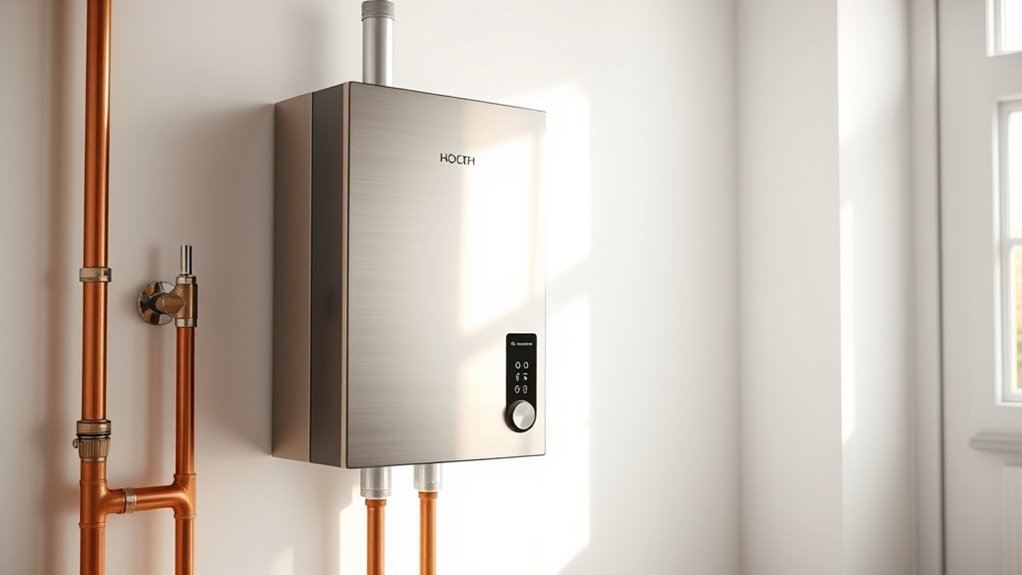A tankless water heater heats water on demand, so it only warms water when you turn on a tap or appliance. This setup reduces standby heat loss and saves space, making it more energy-efficient over time. However, upfront costs and installation can be higher, especially in larger homes with high water demands. To discover if a tankless system suits your needs, consider your household’s hot water use and potential benefits.
Key Takeaways
- Tankless water heaters heat water on demand, eliminating the need for a storage tank.
- They are more energy-efficient and space-saving compared to traditional tank models.
- Ideal for small to medium households, especially if energy savings are a priority.
- Higher upfront installation costs and potential complexity might be a consideration.
- Long-term savings and convenience often justify the initial investment for many homeowners.
How Does a Tankless Water Heater Work?
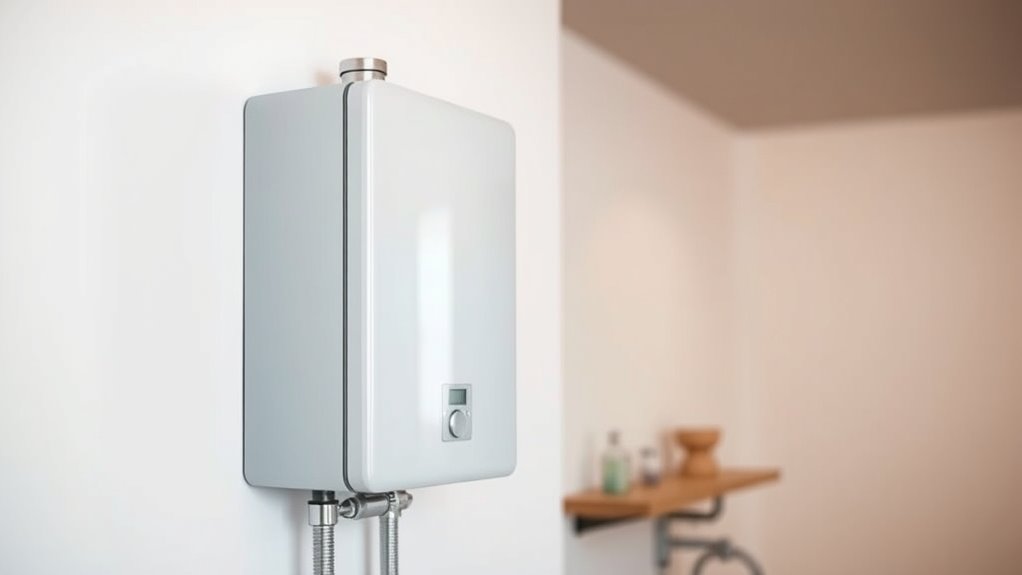
A tankless water heater heats water on demand, meaning it only warms water when you turn on a tap or appliance that needs it. This design boosts energy efficiency because it eliminates standby heat loss common in traditional tanks. When you activate a hot water outlet, a flow sensor detects the demand and activates the heating element or heat exchanger. Water then passes through, heating quickly as it flows through the unit. The installation process involves mounting the unit on a wall and connecting it to your water supply and electrical or gas sources. It’s generally straightforward but may require some modifications to your existing plumbing. Overall, this setup ensures you get hot water efficiently without wasting energy, making tankless systems an attractive choice for many homeowners. Additionally, some models incorporate smart technology to optimize performance and monitor energy usage.
Benefits and Drawbacks of Going Tankless
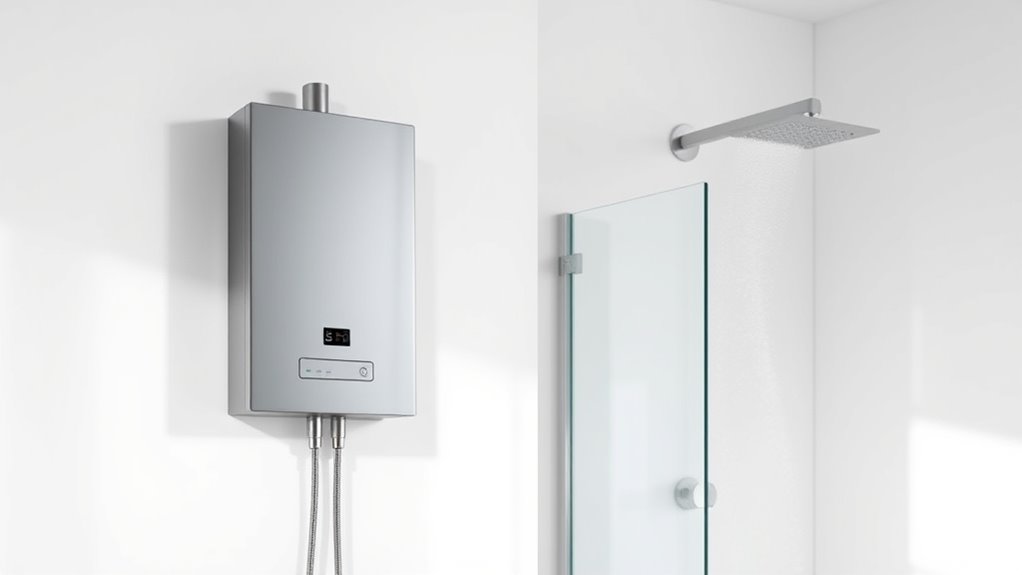
Switching to a tankless water heater offers several compelling benefits, especially regarding energy efficiency and space savings. Because they heat water on demand, they use less energy than traditional tank models, which constantly maintain a reservoir of hot water. This increased energy efficiency can lead to lower utility bills over time. Additionally, tankless units are compact, freeing up valuable space in your home. However, consider that installation costs for a tankless system can be higher upfront, especially if your current setup requires electrical or plumbing upgrades. While the initial investment is greater, many find that the long-term savings and convenience outweigh the initial expenses. Overall, going tankless can be a smart choice if personality assessments and space are priorities for you.
Factors to Consider Before Making the Switch
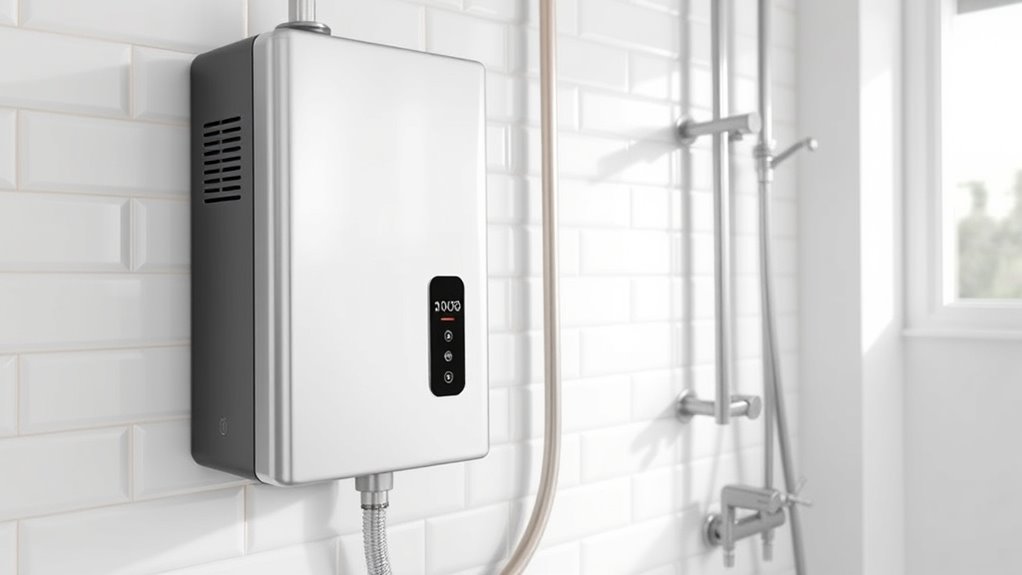
Before replacing your traditional water heater with a tankless model, it’s important to evaluate your household’s hot water needs, budget, and existing plumbing setup. Consider how many fixtures and appliances require hot water simultaneously, as tankless units have flow rate limits. Energy efficiency is a key advantage, but only if the system is properly sized for your usage. Keep in mind that installation costs can be higher upfront compared to traditional heaters, especially if your plumbing needs modifications. You’ll also want to assess your long-term savings on energy bills, which can offset initial expenses over time. By carefully weighing these factors, you can determine whether switching to a tankless water heater aligns with your household’s needs and financial goals. Additionally, understanding your household’s hot water demand is essential to ensure the unit can meet your daily requirements.
Comparing Tankless and Traditional Water Heaters
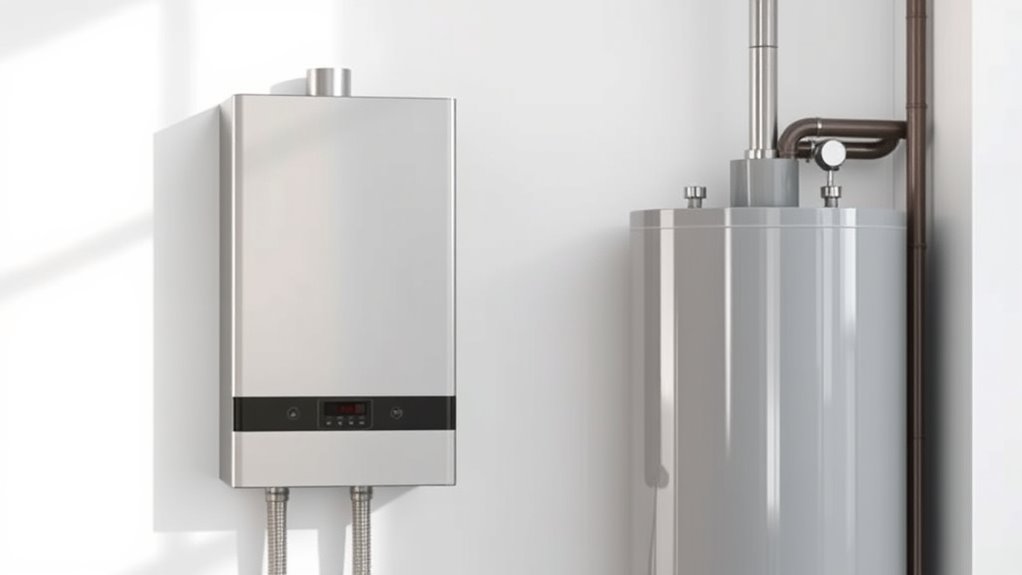
How do you decide between a tankless and traditional water heater? Consider these key differences:
- Energy efficiency: Tankless heaters heat water on demand, reducing standby heat loss, making them more energy-efficient over time.
- Installation costs: While tankless units often have higher initial costs, installation can be more complex, especially if upgrades are needed.
- Usage needs: Traditional heaters store hot water, suitable for high simultaneous demands, whereas tankless units are ideal for smaller households or point-of-use needs.
Your choice depends on balancing upfront expenses with long-term savings. If energy efficiency and space-saving appeal to you, tankless might be better. But if initial costs are a concern, traditional heaters could be more practical.
Is a Tankless Water Heater Right for Your Home?
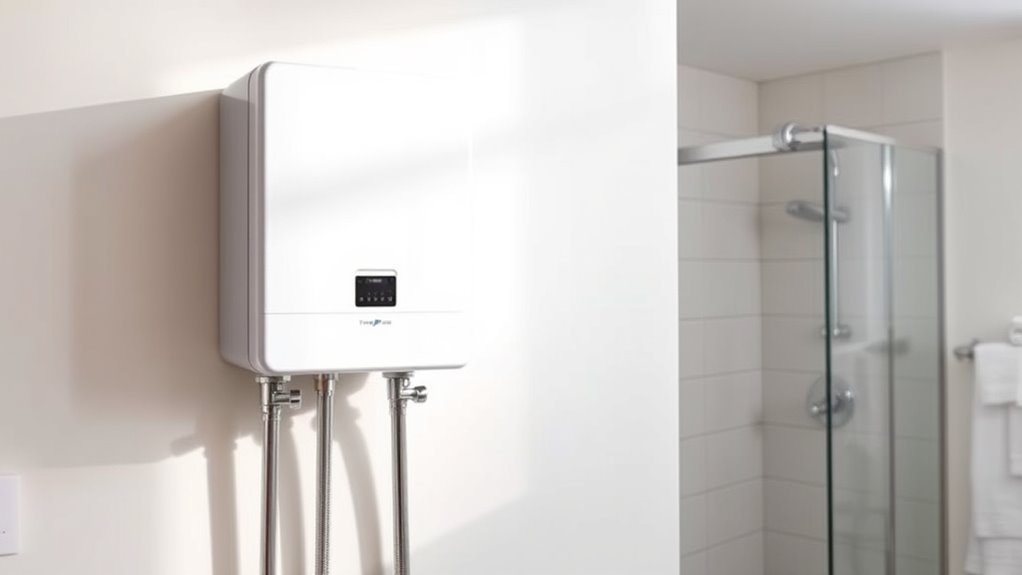
Deciding if a tankless water heater is right for your home depends on your household’s hot water needs, budget, and lifestyle. If you value energy efficiency, a tankless unit can save you money over time because it heats water only when needed. However, installation costs can be higher upfront, especially if your home requires significant modifications or multiple units for larger families. Consider your hot water demand—tankless heaters excel for small to medium households but may struggle with simultaneous, high-demand activities in larger homes. Think about your long-term savings and whether the energy efficiency benefits outweigh the initial investment. Additionally, understanding the installation requirements can help you determine if a tankless water heater is a practical choice for your home. Ultimately, if you’re looking for a space-saving, energy-efficient solution and are prepared for potentially higher installation costs, a tankless water heater could be a good fit.
Frequently Asked Questions
What Is the Typical Lifespan of a Tankless Water Heater?
A tankless water heater usually lasts around 20 years, making it a durable choice for your home. Its energy savings come from providing hot water only when needed, reducing waste. However, you should be aware of potential installation challenges, like venting or space constraints, which may affect its lifespan. Proper maintenance helps maximize its longevity and keep your energy costs low over time.
How Much Does a Tankless Water Heater Cost to Install?
Imagine you’re in the 21st century, and installation costs for a tankless water heater typically range from $1,500 to $3,500, depending on your home’s size and existing plumbing. You can explore financing options to make the upgrade more manageable. Keep in mind, installation costs include labor, permits, and any necessary upgrades, so get multiple quotes to find the best deal for your budget and needs.
Are There Energy Efficiency Differences Between Brands?
You’ll find energy efficiency varies among brands, mainly due to brand reputation and quality. Some brands prioritize energy savings, offering advanced technology to reduce energy use, while others may not perform as well. Look for reputable brands known for durability and efficiency, and check their energy ratings. This way, you guarantee your investment delivers the best energy savings and long-term reliability. Choosing a trusted brand helps you maximize efficiency and save on energy costs.
Can a Tankless Water Heater Supply Multiple Fixtures Simultaneously?
You can typically run multiple fixtures at once with a tankless water heater, but it depends on its water flow rate and fixture capacity. If your unit has a high flow rate, it can handle several showers or appliances simultaneously. However, smaller units might struggle, causing reduced hot water flow. To guarantee it meets your needs, consider your peak fixture capacity and select a model with sufficient flow rate.
What Maintenance Is Required for Optimal Performance?
To keep your tankless water heater running smoothly, you should perform regular flushing to prevent mineral buildup and guarantee efficient heating. Additionally, check and maintain the pilot light if your model has one, making sure it stays lit for proper operation. Regular maintenance helps extend the lifespan of your unit, improves energy efficiency, and prevents unexpected breakdowns, keeping hot water readily available when you need it most.
Conclusion
Deciding whether to get a tankless water heater is like choosing a new adventure — it could transform your home’s comfort and efficiency. Weigh the benefits against the drawbacks, consider your household’s needs, and compare it to traditional options. If you’re ready to embrace a sleek, on-demand solution that saves space and energy, a tankless water heater might just be the key to releasing a warmer, more efficient home. The choice is yours—make it wisely.
